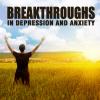Psychiatrists have finally discovered how to better treat depression
"Depression isn't all the same."
"Despite its ubiquity, the disease is complex to understand, and to treat. The latest family of antidepressants was developed in the 1980s and drugs today, while improved, haven’t changed substantially since then."
"A new study, which Hasler co-authored with his colleague Philipp Homan and published in Nature’s Journal of Translational Psychiatry, may shed light on the nature of two of the most common types of depression and could help dramatically improve the accuracy of drug prescription. These two forms of depression are linked to two chemical imbalances: serotonin deficiency and lack of noradrenaline. "
“More psychological symptoms are related to serotonin,” Hasler told Quartz, while “more somatic symptoms—short breath, sweating, feeling of chocking are all bought by [lack of noradrenaline].”
Reducing serotonin in the study subjects, says Hasler, led to what is more commonly recognized as a “depressive mood,” nicknamed a lack of “New-York-type happiness” (positive energy). On the other hand, a reduction of noradrenaline did not cause sadness, but rather a lack of motivation and concentration difficulties, or lack of “Eastern-type” happiness (calmness).
http://qz.com/369385...eat-depression/
There was a time when depression was more of a lack of serotonin so now noradrenaline is involved. I would think my self medication with St. John's Wort, 5-htp, SAMe, led to me having too much serotonin (serotonin syndrome). What could have been had I been supplementing with herbals that may have increased noradrenaline (which I don't really know much).
Fasting[edit]
A study has shown that fasting leads to increased levels of norepinephrine (NE) in the blood for up to 4 days of fasting.[29]
Macronutrient intake[edit]
Glucose intake was found to significantly increase plasma NE levels. In contrast, protein and fat intake was found to have no effect.[30]
Receptor binding modulators[edit]
Examples include alpha blockers for the α-receptors, and beta blockers for the β-receptors.
"Norepinephrine is synthesized from tyrosine as a precursor, and packed into synaptic vesicles. It performs its action by being released into the synaptic cleft, where it acts on adrenergic receptors, followed by the signal termination, either by degradation of norepinephrine or by uptake by surrounding cells."
"The synthesis of norepinephrine depends on the presence of tyrosine, an amino acid found in proteins such as meat, nuts, and eggs. Dairy products such as cheese also contain high amounts of tyrosine (the amino acid is named for "tyros", the Greek word for cheese). However, adult humans readily synthesize tyrosine from phenylalanine, an essential amino acid. Tyrosine is the precursor to dopamine, which in turn is a precursor to epinephrine and norepinephrine."
http://en.wikipedia..../Norepinephrine
So the answer is in amino acids: tyrosine and phenylalanine, one or the other?
Edited by eon, 26 March 2015 - 10:02 AM.






















































